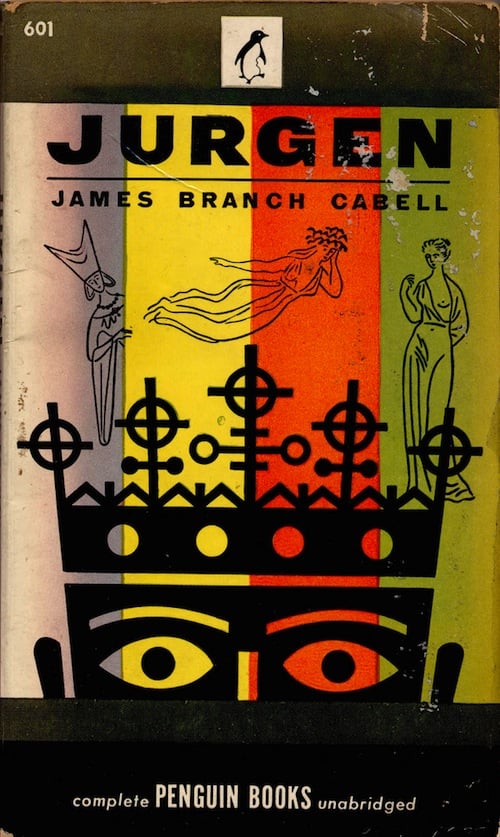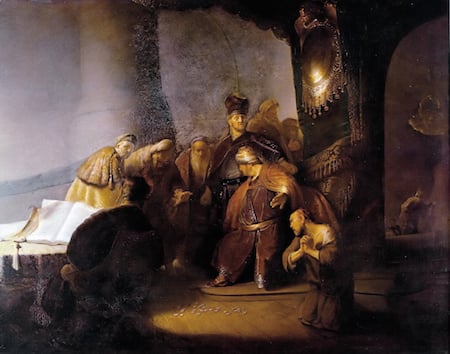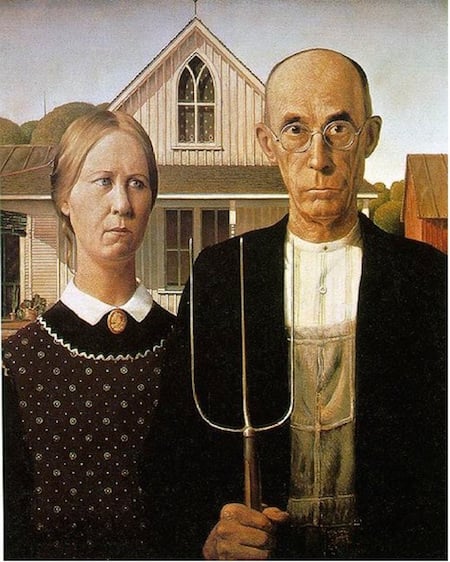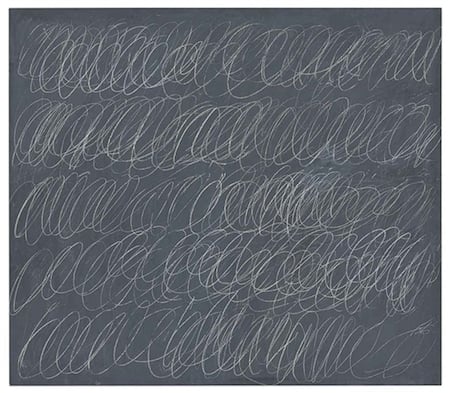Jurgen (50)
By:
February 27, 2016

James Branch Cabell’s 1919 ironic fantasy novel Jurgen, A Comedy of Justice, the protagonist of which seduces women everywhere he travels — including into Arthurian legend and Hell itself — is (according to Aleister Crowley) one of the “epoch-making masterpieces of philosophy.” Cabell’s sardonic inversion of romantic fantasy was postmodernist avant la lettre. HiLoBooks is pleased to serialize Jurgen here at HILOBROW. Enjoy!
“Phew!” said Koshchei, in the ensuing silence: “you had better stay overnight, in any event. I really think, friend, you will be more comfortable, just now at least, in this quiet cave.”
But Jurgen had taken up his hat. “No, I dare say I, too, had better be going,” says Jurgen. “I thank you very heartily for your intended kindness, sir, still I do not know but it is better as it is. And is there anything” — Jurgen coughed delicately —” and is there anything to pay, sir?”
“Oh, just a trifle, first of all, for a year’s maintenance of Dame Lisa. You see, Jurgen, that is an almighty fine shirt you are wearing: it rather appeals to me; and I fancy, from something your wife let drop just now, it did not impress her as being quite suited to you. So, in the interest of domesticity, suppose you ransom Dame Lisa with that fine shirt of yours?”
“Why, willingly,” said Jurgen, and he took off the shirt of Nessus.
“You have worn this for some time, I understand,” said Koshchei, meditatively: “and did you ever notice any inconvenience in wearing this garment?”
“Not that I could detect, Prince; it fitted me, and seemed to impress everybody most favorably.”
“There!” said Koshchei; “that is what I have always contended. To the strong man, and to wholesome matter of fact people generally, it is a fatal irritant; but persons like you can wear the shirt of Nessus very comfortably for a long, long while, and be generally admired; and you end by exchanging it for your wife’s society. But now, Jurgen, about yourself. You probably noticed that my door was marked KEEP OUT. One must have rules, you know. Often it is a nuisance, but still rules are rules; and so I must tell you, Jurgen, it is not permitted any person to leave my presence unmaimed, if not actually annihilated. One really must have rules, you know.”
“You would chop off an arm? or a hand? or a whole finger? Come now, Prince, you must be joking!”

Koshchei the Deathless was very grave as he sat there, in meditation, drumming with his long jet-black fingers upon the table-top that was curiously inlaid with thirty pieces of silver. In the lamplight his sharp nails glittered like flame points, and the color suddenly withdrew from his eyes, so that they showed like small white eggs.
“But, man, how strange you are!” said Koshchei, presently; and life flowed back into his eyes, and Jurgen ventured the liberty of breathing. “Inside, I mean. Why, there is hardly anything left. Now rules are rules, of course; but you, who are the remnant of a poet, may depart unhindered whenever you will, and I shall take nothing from you. For really it is necessary to draw the line somewhere.”
Jurgen meditated this clemency; and with a sick heart he seemed to understand. “Yes; that is probably the truth; for I have not retained the faith, nor the desire, nor the vision. Yes, that is probably the truth. Well, at all events, Prince, I very unfeignedly admired each of the ladies to whom you were friendly enough to present me, and I was greatly flattered by their offers. More than generous I thought them. But it really would not do for me to take up with any one of them now. For Lisa is my wife, you see. A great deal has passed between us, sir, in the last ten years — And I have been a sore disappointment to her, in many ways — And I am used to her —”
Then Jurgen considered, and regarded the black gentleman with mingled envy and commiseration. “Why, no, you probably would not understand, sir, on account of your not being, I suppose, a married person. But I can assure you it is always pretty much like that.”
“I lack grounds to dispute your aphorism,” observed Koshchei, “inasmuch as matrimony was certainly not included in my doom. None the less, to a by-stander, the conduct of you both appears remarkable. I could not understand, for example, just how your wife proposed to have you keep out of her sight forever and still have supper with her to-night; nor why she should desire to sup with such a reprobate as she described with unbridled pungency and disapproval.”
“Ah, but again, it is always pretty much like that, sir. And the truth of it, Prince, is a great symbol. The truth of it is, we have lived together so long that my wife has become rather foolishly fond of me. So she is not, as one might say, quite reasonable about me. No, sir; it is the fashion of women to discard civility toward those for whom they suffer most willingly; and whom a woman loveth she chasteneth, after a good precedent.”

“But her talking, Jurgen, has nowhere any precedent. Why, it deafens, it appals, it submerges you in an uproarious sea of fault-finding; and in a word, you might as profitably oppose a hurricane. Yet you want her back! Now assuredly, Jurgen, I do not think very highly of your wisdom, but by your bravery I am astounded.”
“Ah, Prince, it is because I can perceive that all women are poets, though the medium they work in is not always ink. So the moment Lisa is set free from what, in a manner of speaking, sir, inconsiderate persons might, in their unthinking way, refer to as the terrors of an underground establishment that I do not for an instant doubt to be conducted after a system which furthers the true interests of everybody, and so reflects vast credit upon its officials, if you will pardon my frankness” — and Jurgen smiled ingratiatingly, — “why, at that moment Lisa’s thoughts take form in very much the high denunciatory style of Jeremiah and Amos, who were remarkably fine poets. Her concluding observations as to the Countess, in particular, I consider to have been an example of sustained invective such as one rarely encounters in this degenerate age. Well, her next essay in creative composition is my supper, which will be an equally spirited impromptu. To-morrow she will darn and sew me an epic; and her desserts will continue to be in the richest lyric vein. Such, sir, are the poems of Lisa, all addressed to me, who came so near to gallivanting with mere queens!”
“What, can it be that you are remorseful?” said Koshchei.
“Oh, Prince, when I consider steadfastly the depth and the intensity of that devotion which, for so many years, has tended me, and has endured the society of that person whom I peculiarly know to be the most tedious and irritating of companions, I stand aghast, before a miracle. And I cry, Oh, certainly a goddess! and I can think of no queen who is fairly mentionable in the same breath. Hah, all we poets write a deal about love: but none of us may grasp the word’s full meaning until he reflects that this is a passion mighty enough to induce a woman to put up with him.”
“Even so, it does not seem to induce quite thorough confidence. Jurgen, I was grieved to see that Dame Lisa evidently suspects you of running after some other woman in your wife’s absence.”
“Think upon that now! And you saw for yourself how little the handsomest of women could tempt me. Yet even Lisa’s absurd notion I can comprehend and pardon. And again, you probably would not understand my overlooking such a thing, sir, on account of your not being a married person. Nevertheless, my forgiveness also is a great symbol.”
Then Jurgen sighed and he shook hands, very circumspectly, with Koshchei, who made things as they are; and Jurgen started out of the office.
“But I will bear you company a part of the way,” says Koshchei.
So Koshchei removed his dressing-gown, and he put on the fine laced coat which was hung over the back of a strange looking chair with three legs, each of a different metal; the shirt of Nessus Koshchei folded and put aside, saying that some day he might be able to use it somehow. And Koshchei paused before the blackboard and he scratched his head reflectively. Jurgen saw that this board was nearly covered with figures which had not yet been added up; and this blackboard seemed to him the most frightful thing he had faced anywhere.

Then Koshchei came out of the cave with Jurgen, and Koshchei walked with Jurgen across Amneran Heath, and through Morven, in the late evening. And Koshchei talked as they went; and a queer thing Jurgen noticed, and it was that the moon was sinking in the east, as though the time were getting earlier and earlier. But Jurgen did not presume to criticize this, in the presence of Koshchei, who made things as they are.
“And I manage affairs as best I can, Jurgen. But they get in a fearful muddle sometimes. Eh, sirs, I have no competent assistants. I have to look out for everything, absolutely everything! And of course, while in a sort of way I am infallible, mistakes will occur every now and then in the actual working out of plans that in the abstract are right enough. So it really does please me to hear anybody putting in a kind word for things as they are, because, between ourselves, there is a deal of dissatisfaction about. And I was honestly delighted, just now, to hear you speaking up for evil in the face of that rapscallion monk. So I give you thanks and many thanks, Jurgen, for your kind word.”
“‘Just now!'” thinks Jurgen. He perceived that they had passed the Cistercian Abbey, and were approaching Bellegarde. And it was as in a dream that Jurgen was speaking, “Who are you, and why do you thank me?” asks Jurgen.
“My name is no great matter. But you have a kind heart, Jurgen. May your life lie free from care.”
“Save us from hurt and harm, friend, but I am already married —” Then resolutely Jurgen put aside the spell that was befogging him. “See here, Prince, are you beginning all over again? For I really cannot stand any more of your benevolences.”
Koshchei smiled. “No, Jurgen, I am not beginning all over again. For now I have never begun, and now there is no word of truth in anything which you remember of the year just past. Now none of these things has ever happened.”
“But how can that be, Prince?”
“Why should I tell you, Jurgen? Let it suffice that what I will, not only happens, but has already happened, beyond the ancientest memory of man and his mother. How otherwise could I be Koshchei? And so farewell to you, poor Jurgen, to whom nothing in particular has happened now. It is not justice I am giving you, but something infinitely more acceptable to you and all your kind.”
“But, to be sure!” says Jurgen. “I fancy that nobody anywhere cares much for justice. So farewell to you, Prince. And at our parting I ask no more questions of you, for I perceive it is scant comfort a man gets from questioning Koshchei, who made things as they are. But I am wondering what pleasure you get out of it all?”
“Eh, sirs,” says Koshchei, with not the most candid of smiles, “I contemplate the spectacle with appropriate emotions.”
And so speaking, Koshchei quitted Jurgen forever.
“Yet how may I be sure,” thought Jurgen, instantly, “that this black gentleman was really Koshchei? He said he was? Why, yes; and Horvendile to all intents told me that Horvendile was Koshchei. Aha, and what else did Horvendile say! — ‘This is one of the romancer’s most venerable devices that is being practised.’ Why, but there was Smoit of Glathion, also, so that this is the third time I have been fobbed off with the explanation I was dreaming! and left with no proof, one way or the other.”
Thus Jurgen, indignantly, and then he laughed. “Why, but, of course! I may have talked face to face with Koshchei, who made all things as they are; and again, I may not have. That is the whole point of it — the cream, as one might say, of the jest — that I cannot ever be sure. Well!” — and Jurgen shrugged here — “well, and what could I be expected to do about it?”
Footnotes from Notes on Jurgen (1928), by James P. Cover — with additional comments from the creators of this website; rewritten, in some instances, by HiLoBooks.
RADIUM AGE SCIENCE FICTION: “Radium Age” is HILOBROW’s name for the 1904–33 era, which saw the discovery of radioactivity, the revelation that matter itself is constantly in movement — a fitting metaphor for the first decades of the 20th century, during which old scientific, religious, political, and social certainties were shattered. This era also saw the publication of genre-shattering writing by Edgar Rice Burroughs, Sax Rohmer, E.E. “Doc” Smith, Jack London, Arthur Conan Doyle, Aldous Huxley, Olaf Stapledon, Karel Čapek, H.P. Lovecraft, Charlotte Perkins Gilman, Yevgeny Zamyatin, Philip Gordon Wylie, and other pioneers of post-Verne/Wells, pre-Golden Age “science fiction.” More info here.
READ GORGEOUS PAPERBACKS: HiLoBooks has reissued the following 10 obscure but amazing Radium Age science fiction novels in beautiful print editions: Jack London’s The Scarlet Plague, Rudyard Kipling’s With the Night Mail (and “As Easy as A.B.C.”), Arthur Conan Doyle’s The Poison Belt, H. Rider Haggard’s When the World Shook, Edward Shanks’ The People of the Ruins, William Hope Hodgson’s The Night Land, J.D. Beresford’s Goslings, E.V. Odle’s The Clockwork Man, Cicely Hamilton’s Theodore Savage, and Muriel Jaeger’s The Man with Six Senses. For more information, visit the HiLoBooks homepage.
SERIALIZED BY HILOBOOKS: Jack London’s The Scarlet Plague | Rudyard Kipling’s With the Night Mail (and “As Easy as A.B.C.”) | Arthur Conan Doyle’s The Poison Belt | H. Rider Haggard’s When the World Shook | Edward Shanks’ The People of the Ruins | William Hope Hodgson’s The Night Land | J.D. Beresford’s Goslings | E.V. Odle’s The Clockwork Man | Cicely Hamilton’s Theodore Savage | Muriel Jaeger’s The Man With Six Senses | Jack London’s “The Red One” | Philip Francis Nowlan’s Armageddon 2419 A.D. | Homer Eon Flint’s The Devolutionist | W.E.B. DuBois’s “The Comet” | Edgar Rice Burroughs’s The Moon Men | Charlotte Perkins Gilman’s Herland | Sax Rohmer’s “The Zayat Kiss” | Eimar O’Duffy’s King Goshawk and the Birds | Frances Hodgson Burnett’s The Lost Prince | Morley Roberts’s The Fugitives | Helen MacInnes’s The Unconquerable | Geoffrey Household’s Watcher in the Shadows | William Haggard’s The High Wire | Hammond Innes’s Air Bridge | James Branch Cabell’s Jurgen | John Buchan’s “No Man’s Land” | John Russell’s “The Fourth Man” | E.M. Forster’s “The Machine Stops” | John Buchan’s Huntingtower | Arthur Conan Doyle’s When the World Screamed | Victor Bridges’ A Rogue By Compulsion | Jack London’s The Iron Heel | H. De Vere Stacpoole’s The Man Who Lost Himself | P.G. Wodehouse’s Leave It to Psmith | Richard Connell’s “The Most Dangerous Game” | Houdini and Lovecraft’s “Imprisoned with the Pharaohs” | Arthur Conan Doyle’s “The Sussex Vampire”.
ORIGINAL FICTION: HILOBROW has serialized three novels: James Parker’s The Ballad of Cocky The Fox (“a proof-of-concept that serialization can work on the Internet” — The Atlantic); Karinne Keithley Syers’s Linda Linda Linda (which includes original music); and Robert Waldron’s roman à clef The School on the Fens. We also publish original stories and comics. These include: Matthew Battles’s stories “Gita Nova“, “Makes the Man,” “Imago,” “Camera Lucida,” “A Simple Message”, “Children of the Volcano”, “The Gnomon”, “Billable Memories”, “For Provisional Description of Superficial Features”, “The Dogs in the Trees”, “The Sovereignties of Invention”, and “Survivor: The Island of Dr. Moreau”; several of these later appeared in the collection The Sovereignties of Invention | Peggy Nelson’s “Mood Indigo“, “Top Kill Fail“, and “Mercerism” | Annalee Newitz’s “The Great Oxygen Race” | Flourish Klink’s Star Trek fanfic “Conference Comms” | Charlie Mitchell’s “A Fantasy Land” | Charlie Mitchell’s “Sentinels” | Joshua Glenn’s “The Lawless One”, and the mashup story “Zarathustra vs. Swamp Thing” | Adam McGovern and Paolo Leandri’s Idoru Jones comics | John Holbo’s “Sugarplum Squeampunk” | “Another Corporate Death” (1) and “Another Corporate Death” (2) by Mike Fleisch | Kathryn Kuitenbrouwer and Frank Fiorentino’s graphic novel “The Song of Otto” (excerpt) | John Holbo’s graphic novel On Beyond Zarathustra (excerpt) | “Manoj” and “Josh” by Vijay Balakrishnan | “Verge” by Chris Rossi, and his audio novel Low Priority Hero | EPIC WINS: THE ILIAD (1.408-415) by Flourish Klink | EPIC WINS: THE KALEVALA (3.1-278) by James Parker | EPIC WINS: THE ARGONAUTICA (2.815-834) by Joshua Glenn | EPIC WINS: THE MYTH OF THE ELK by Matthew Battles | TROUBLED SUPERHUMAN CONTEST: Charles Pappas, “The Law” | CATASTROPHE CONTEST: Timothy Raymond, “Hem and the Flood” | TELEPATHY CONTEST: Rachel Ellis Adams, “Fatima, Can You Hear Me?” | OIL SPILL CONTEST: A.E. Smith, “Sound Thinking | LITTLE NEMO CAPTION CONTEST: Joe Lyons, “Necronomicon” | SPOOKY-KOOKY CONTEST: Tucker Cummings, “Well Marbled” | INVENT-A-HERO CONTEST: TG Gibbon, “The Firefly” | FANFICTION CONTEST: Lyette Mercier’s “Sex and the Single Superhero”
